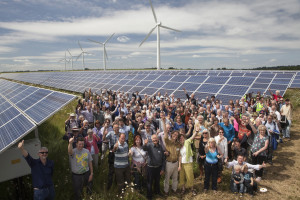
The Westmill Energy Coop is the largest in the UK. Together the local community has rasied more than £20 million for 5 wind turbines and a ground-mounted solar array. Members receive an average of 8% return on their investment.
A few months ago the government set up a new fund to kick start community energy schemes. The Rural Community Energy Fund (RCEF) is designed to get the ball rolling – the first bit of the fund is a grant of up to £20,000.
To apply for the fund, you need to be able to demonstrate a few things. The areas below could act as talking points when your community first starts to consider its very own energy coop.
Community Support
First of all you need to demonstrate that your community supports the idea of an energy coop. Almost all existing UK energy coops (there are more than 50) have started with a public meeting. However, you could also discuss the idea with your local council, or conduct an online survey.
A good way to show that your community is interested is a demonstration of numbers. That can be quantified by numbers at a meeting, members of a Facebook page, an email list, survey results as well as publicity materials that show your community has been engaged.
Another good way to show engagement is getting partners on board i.e. local organisations, businesses and institutions.
What’s the project going to be?
There are lots of renewable energy technologies and the RCEF has certain criteria as to what they’ll support. In particular the fund supports projects that require planning permission and significant pre-planning development, generate energy for multiple buildings or that require significant cash to build.
That could mean, perhaps, biomass biolers, wind turbines, a ground-mounted solar farms or anaerobic digesters. A single building-mounted solar system is likely to be less favorably looked on since it doesn’t require planning.
Location
Finding a site can be a surprisingly tricky bit of the operation. The fund encourages you to identify a suitable site for your chosen technology (perhaps with some preliminary discussions with the freeholder), and have a pre-planning chat with planners about whether your community’s idea is likely to be looked on favourably.
Defining the community benefit
This requires a bit of thinking through. Typically, existing energy coops invest in a ‘revolving fund’ which re-invests some surplus into a fund which then generates more projects. Other benefits might include reduced energy costs for members of the community, investment in community facilities, or the creation of jobs and further growth.
What can we do with the grant monies?
Because energy coops can be a complex business (and hence almost always a successful business), you’ll need some specialist input. The grant is to cover the costs of these specialists.
In particular, the fund supports project managers (to take the project from start to finish), accountants (for developing the financial model), technical consultants (to work out the technological stuff) and planning consultants (who make sure the project will be accepted on planning). These can come from inside or outside your community, but the fund requires quotes from 3 relevant consultants.
Brighton Energy Coop can help with advice on the RCEF – drop us a line: info@brightonenergy.org.uk
More on the RCEF: http://www.wrap.org.uk/content/rural-community-energy-fund
0808 100 2040
renewables@wrap.org.uk